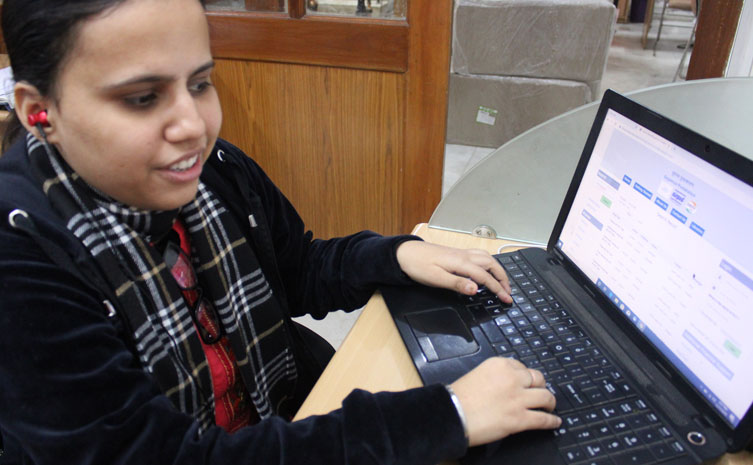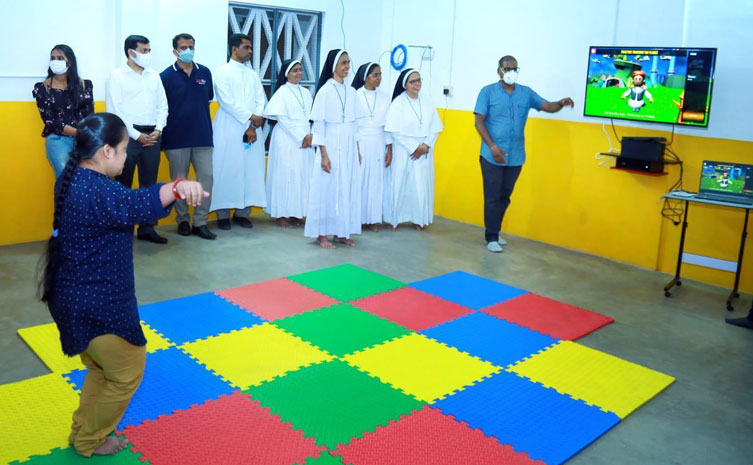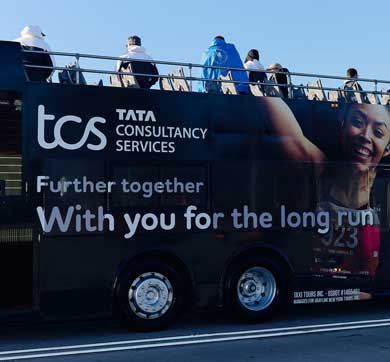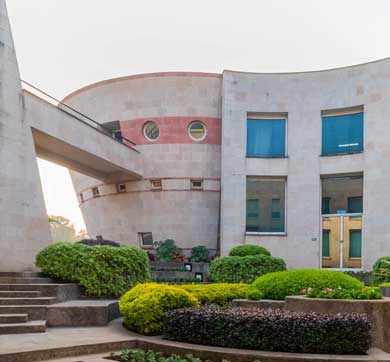June 2023 | 1345 words | 5-minute read
For children with locomotor disabilities at Adarsh Rehabilitation Centre (ARC) in Kochi, a session with VHab is the highlight of their day. The assistive virtual reality 'game' motivates the children to undergo physiotherapy sessions that are critical to their well-being – for some, even lifting a spoon could be a challenge.
Dipendra Manocha, Founder-Trustee of Saksham Trust, says Sugamya Pustakalaya brought the joy of reading back into his life. The online library for the visually impaired has increased access to information and provided an opportunity for Saksham Trust to contribute towards this growing collection.
Over 3,000 children with cerebral palsy find it easier to communicate using Assisto. It uses artificial intelligence to help them converse at school or at home, and enhances not only their quality of life but also the lives of their caregivers.
Inspired by the values of the Tata group's Founder, these are some of the digital accessibility solutions that Tata Consultancy Services (TCS) has developed as part of its effort to create a more empathetic, equitable, and accessible world using technology.
The promise of technology
In 2006, the United Nations adopted the Convention on the Rights of Persons with Disabilities and its Optional Protocol, which marked a seminal change in how the world viewed persons with disabilities, shifting from 'objects of charity' to 'subjects with rights'. And it is with this rights-based perspective that TCS has institutionalised a multi-dimensional approach to build social and human capital that puts the principle 'inclusion without exception' in action.

Much of TCS’ work in the accessibility space is the outcome of its five-pronged approach to increase inclusion of persons with disabilities (see below). This includes partnerships with government bodies and NGOs to create equal opportunities, building on TCS’ practices to help achieve workplace integration, creating processes, infrastructure and workplaces that ensure accessibility by default—but most of all, harnessing technology to deliver inclusive products and services that empower people with disabilities.
The intent to ensure a level playing field is baked into TCS’ practices. “A diverse workforce is a competitive advantage,” says Milind Lakkad, Chief Human Resources Officer, TCS. “Our focus is to leverage individual strengths and power innovation to build a ‘future forward’ inclusive mindset through the lens of empathy, human relationships and One TCS.”
The fight for digital accessibility
As with any complex, large-scale and intergenerational transformation, the challenges are myriad. “There are three major challenges that we, as a nation, must seek to overcome,” says Dr Charudatta Jadhav, who heads TCS’ Accessibility Center of Excellence, and has been involved with the rights of persons with disabilities and the technological solutions they need for decades. “Firstly, the cost of technological innovation is high. Then there are last-mile logistics; getting products to those who need them is not easy. The third problem is that of capital to invest in home-grown research.” However, he adds that things have drastically improved with close to 100 start-ups engaged in addressing these challenges.
Disability in India The increase in the development of assistive technologies is game changing for the 2.21% of Indians (or 2.68 crore) who have a disability. According to the 2011 census, the age group of 10-19 years has the highest percentage of disabled persons — 17% (46.2 lakh) — with 16% (41.8 lakh) of disabled persons being in the age group of 20-29 years.
“The area is unique and needs a lot of attention in terms of creating awareness among the larger crowd about involving the IDD (intellectual or developmental disability) community,” says Robin Tommy, who heads TCS’ Rapid Labs, which developed VHab. “Despite progress, there is ignorance. For example, most of the technologies available are focused on other categories and are being pushed to the IDD/neurodiverse population without much research and analysis. We need to invest more time, have meaningful engagements and build trust.”
TCS’ Access Infinity
Perhaps the most ambitious of TCS’ solutions is Access Infinity, a platform that powers Sugamya Pustakalaya, an online library for the visually impaired. The portal is a pan-India ecosystem for real-time publishing of accessible content. The initiative is executed by Daisy Forum of India (a consortium of over 100 NGOs), and the portal has more than 6.5 million books, 203 libraries, content/syllabi of leading Indian universities, 13 education boards, popular newspapers and magazines.
The portal converts the content into formats like Braille, DAISY text/audio, and EPUB3. Sugamya Pustakalaya served as a critical resource for the visually impaired community during the Covid-19 pandemic. The portal has a target of registering over 10 lakh users by 2025.
“A unique feature of Sugamya Pustakalaya is that it takes care of publishers’ copyright, while not compromising on accessibility,” says Dr Jadhav. “We are also governed by the Marrakesh Treaty of 2016 that enables transfer of copyright material to blind users easily.”
Assistive technology innovations
“It is estimated that one in six people in the world have some disability,” says K Ananth Krishnan, Chief Technology Officer, TCS. “Accessible technologies serve the needs of a large segment of the population and investing in them makes both business sense and societal impact. At TCS Research and Innovation, we have been guided by the Tata ethos of harnessing technology for societal benefit and it has resulted in a range of innovative technology interventions for persons with disabilities.”
TCS’ VHab uses motion sensors and gesture analysis to create a visually rich experience. Initially introduced at ARC, it is now making a difference in the lives of almost 200 children across three institutes in Kerala. “Earlier, the kids were reluctant to do the same exercises every day. But now they keep asking us when their turn will come,” says Ambili Francis, a physiotherapist at ARC.

Assisto, another solution developed at TCS’ Rapid Labs, uses cognitive speech algorithms to convert communication by children with neurological conditions into speech, incorporating not just their unique tone but also their native language. The low-cost device uses a first-of-its-kind customised Morse keypad with speech output and is being used by over 3,000 children worldwide.
Verbose is a solution for the hearing impaired—it enables end-to-end speech-to-text conversion. It converts live speech, for example, lectures, into real-time data that can be viewed in different formats, such as animated video, comic strips, notes, etc. More than 1,000 children worldwide are using Verbose and it is part of many assistive conference kits, helping the hearing-impaired engage with content at their own pace.
Under development at TCS labs is a ‘smart glass’ that senses and identifies objects and describes them to the wearer. The device has the potential to not only read print but also recognize faces and moods. While this will help a visually impaired person to move independently, it can also help a hearing-impaired person understand speech by converting voice into sign language.
TCS is also working with software company Adobe to ensure that accessibility is built into their publishing and document management solutions and products, such as the widely used Portable Document Format (PDF).
Ensuring inclusive growth
“TCS’ social innovation initiatives for the neurodiverse have enabled people to empower themselves and pursue opportunities in digital and data,” says Mr Tommy. “Also, the neurodiverse community has provided us with many opportunities for inclusivity and helped us create solutions of tomorrow.”
“Enabling access also makes tremendous business sense,” says Dr Jadhav, citing the example of several products that have crossed over into the mainstream, such as audiobooks and motion-activated doors. Another example is the use of eye-tracking software, which was developed for those with locomotor impairment and is now widely used for driver safety.
“However, a lot of awareness and work needs to be done,” adds Dr Jadhav. “The consumer market has the potential of adding over $70 billion just by paying attention to accessibility.” TCS recognized this potential early on and created the Accessibility Center of Excellence that helps clients enhance their ability to address this market using technology.
More than a century ago, the Tata group Founder Jamsetji Tata envisioned a model of business that considered service to the community as the purpose of its existence. This vision was taken ahead by the group’s leaders in subsequent decades, in particular, JRD Tata, who was influential in setting up the Tata Research Development and Design Centre, TCS’ first research and innovation lab, with the objective of using technology for societal benefit. Since then, TCS has continued its mission to harness technology to power inclusivity, diversity, and equity.
TCS' five-pronged approach to inclusion
- Community, collaboration and partnership: using technology to empower persons iwth disabiltiies, while collaborating with NGOs to create equal opportunities.
- Culture and mindset: focused efforts on integration by the TCS Culture and Diversity teams
- Policy and process: TCS is in the process of integrating accessibility into its policies and processes
- Technology: the company harnesses technology to deliver inclusive digital products and services.
- Infrastructure/workspaces: TCS wroks to provide physical and infrastructural access to all people.
Awards and recognition
Assissto
- NASSCOM Engineering and Innovation Excelence Awards - Social Impact Solution of te Year 2021
- Golden Globe Tigers Award 2020 for establishing Innovation in Design
Sugamaya Pustakalaya, powered by TCS' Access Infinity
- Winner, Zero Project Award 2021
- Haroon Bijli
































